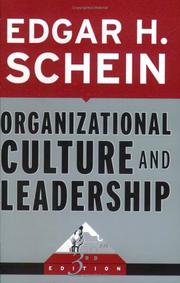| Listing 1 - 10 of 16 | << page >> |
Sort by
|
Book
ISBN: 9780415481427 9780203857595 9781135158255 9781135158200 9781135158248 9780415481434 Year: 2010 Publisher: Abingdon, Oxon Routledge
Abstract | Keywords | Export | Availability | Bookmark
 Loading...
Loading...Choose an application
- Reference Manager
- EndNote
- RefWorks (Direct export to RefWorks)
Book
ISBN: 9781625275325 Year: 2015 Publisher: Boston, MA : Harvard Business Review Press,
Abstract | Keywords | Export | Availability | Bookmark
 Loading...
Loading...Choose an application
- Reference Manager
- EndNote
- RefWorks (Direct export to RefWorks)
Every organization has its share of political drama : Personalities clash. Agendas compete. Turf wars erupt. But you need to work productively with your colleagues - even difficult ones - for the good of your organization and your career. How can you do that without compromising your personal values ? By acknowledging that power dynamics and unwritten rules exist - and navigating them constructively.
Book
ISBN: 9780063063327 Year: 2021 Publisher: New York : Harper Business,
Abstract | Keywords | Export | Availability | Bookmark
 Loading...
Loading...Choose an application
- Reference Manager
- EndNote
- RefWorks (Direct export to RefWorks)
The author explains why some employees are considered Impact Players, what they do differently to become irreplaceable, and how others can emulate them and make teams more productive.
EMPLOYEE MOTIVATION --- PERFORMANCE --- ORGANIZATIONAL EFFECTIVENESS --- ORGANIZATIONAL BEHAVIOR
Book
ISBN: 9781506357997 1506357997 Year: 2018 Publisher: Los Angeles (Calif.): Sage,
Abstract | Keywords | Export | Availability | Bookmark
 Loading...
Loading...Choose an application
- Reference Manager
- EndNote
- RefWorks (Direct export to RefWorks)
Change is a constant in today's organizations. Leaders, managers, and employees at all levels must understand both how to implement planned change and effectively handle unexpected change. This fifth edition provides an eye-opening exploration into the nature of change by presenting the latest evidence-based research to discuss a range of theories, models, and perspectives on organization change. The author skilfully connects theory to practice with modern cases of effective and ineffective organization change, recent examples of transformational leadership and planned and revolutionary change, and best practices to successfully influence change.
Organizational change --- Leadership --- Organizational behavior --- ORGANIZATIONAL CHANGE --- LEADERSHIP
Book
ISBN: 9780566091537 9780566091544 Year: 2011 Publisher: Burlington, VT : Gower,
Abstract | Keywords | Export | Availability | Bookmark
 Loading...
Loading...Choose an application
- Reference Manager
- EndNote
- RefWorks (Direct export to RefWorks)
Corporations --- Fraud. --- Corrupt practices. --- ORGANIZATIONAL BEHAVIOR --- COMMERCIAL CRIMES. --- EMPLOYEE CRIMES. --- FRAUD --- CRIME PREVENTION --- BUSINESS ETHICS --- EMPLOYEES, TRAINING OF--CROSS-CULTURAL STUDIES --- PREVENTION.

ISBN: 0803987021 080398703X 9780803987036 Year: 1993 Publisher: London: Sage,
Abstract | Keywords | Export | Availability | Bookmark
 Loading...
Loading...Choose an application
- Reference Manager
- EndNote
- RefWorks (Direct export to RefWorks)
Organization theory --- Organisatie --- Organisatiesociologie --- Organisation --- Organization --- Organizational sociology --- Sociologie des organisations --- Organizational behavior --- Organizations --- Comportement organisationnel --- Organisations --- Organizational sociology. --- Terminology. --- OrganizationTerminology. --- Associations, institutions, etc. --- Terminology --- Organizational sociology - Terminology. --- Organization - Terminology.

ISBN: 0787975974 0787968455 Year: 2004 Publisher: San Francisco : Jossey-Bass,
Abstract | Keywords | Export | Availability | Bookmark
 Loading...
Loading...Choose an application
- Reference Manager
- EndNote
- RefWorks (Direct export to RefWorks)
organisatiemanagement --- Sociology of organization --- Organization theory --- Leadership Leadership --- Culture d'organisation Organisatiecultuur --- Changement Verandering --- Corporate culture. --- Culture. --- Leadership. --- CORPORATE CULTURE --- LEADERSHIP --- Culture d'entreprise --- Culture --- Leadership --- Corporate culture --- Cultural sociology --- Sociology of culture --- Civilization --- Popular culture --- Culture, Corporate --- Institutional culture --- Organizational culture --- Corporations --- Organizational behavior --- Business anthropology --- Ability --- Command of troops --- Followership --- Social aspects --- Sociological aspects
Book
ISBN: 0803950403 0803950411 Year: 1993 Publisher: Newbury Park, Calif. : Sage Publications,
Abstract | Keywords | Export | Availability | Bookmark
 Loading...
Loading...Choose an application
- Reference Manager
- EndNote
- RefWorks (Direct export to RefWorks)
Organization --- Organizational behavior --- Organizational sociology --- Organisation --- Comportement organisationnel --- Sociologie des organisations --- 65.01 --- Organization (Sociology) --- Organization theory --- Sociology of organizations --- Sociology --- Bureaucracy --- Behavior in organizations --- Management --- Psychology, Industrial --- Social psychology --- Methods and methodology. Theory and practice of organization --- ManagementMethods and methodology. Theory and practice of organization --- 65.01 Methods and methodology. Theory and practice of organization
ISBN: 0801459303 0801475783 Year: 2008 Publisher: Ithaca : Cornell University Press,
Abstract | Keywords | Export | Availability | Bookmark
 Loading...
Loading...Choose an application
- Reference Manager
- EndNote
- RefWorks (Direct export to RefWorks)
While popular accounts of warfare, particularly of nontraditional conflicts such as guerrilla wars and insurgencies, favor the roles of leaders or ideology, social-scientific analyses of these wars focus on aggregate categories such as ethnic groups, religious affiliations, socioeconomic classes, or civilizations. Challenging these constructions, Abdulkader H. Sinno closely examines the fortunes of the various factions in Afghanistan, including the mujahideen and the Taliban, that have been fighting each other and foreign armies since the 1979 Soviet invasion. Focusing on the organization of the combatants, Sinno offers a new understanding of the course and outcome of such conflicts. Employing a wide range of sources, including his own fieldwork in Afghanistan and statistical data on conflicts across the region, Sinno contends that in Afghanistan, the groups that have outperformed and outlasted their opponents have done so because of their successful organization. Each organization's ability to mobilize effectively, execute strategy, coordinate efforts, manage disunity, and process information depends on how well its structure matches its ability to keep its rivals at bay. Centralized organizations, Sinno finds, are generally more effective than noncentralized ones, but noncentralized ones are more resilient absent a safe haven. Sinno's organizational theory explains otherwise puzzling behavior found in group conflicts: the longevity of unpopular regimes, the demise of popular movements, and efforts of those who share a common cause to undermine their ideological or ethnic kin. The author argues that the organizational theory applies not only to Afghanistan-where he doubts the effectiveness of American state-building efforts-but also to other ethnic, revolutionary, independence, and secessionist conflicts in North Africa, the Middle East, and beyond.
Low-intensity conflicts (Military science) --- Organizational behavior --- Intergroup relations --- Afghanistan --- History --- Conflict, Intergroup --- Intergroup conflict --- Relations, Intergroup --- Behavior in organizations --- Conflicts, Low-intensity (Military science) --- Low-intensity operations (Military science) --- Low-level conflicts (Military science) --- Operations, Low-intensity (Military science) --- Small wars --- Wars, Small --- Social interaction --- Management --- Organization --- Psychology, Industrial --- Social psychology --- Limited war --- Soviet Union
Book
ISBN: 2760520838 1435682661 9781435682665 9782760506190 2760506193 9782760520837 Year: 1992 Volume: 8 Publisher: Sillery: Presses de l'Université du Québec,
Abstract | Keywords | Export | Availability | Bookmark
 Loading...
Loading...Choose an application
- Reference Manager
- EndNote
- RefWorks (Direct export to RefWorks)
Le T-Group et le réseau de groupes - Le groupe comme cadre privilégié des apprentissages (leadership, fonctionnement des équipes, diagnostics organisationnels, gestion de projets, etc.).
Corporate culture. --- Organization - Research. --- Organizational change. --- Management --- Business & Economics --- Management Styles & Communication --- Organizational effectiveness. --- Organization --- Changement organisationnel. --- Efficacité organisationnelle. --- Organisation --- Culture d'entreprise. --- Research. --- Recherche. --- Culture, Corporate --- Institutional culture --- Organizational culture --- Organizational research --- Change, Organizational --- Organization development --- Organizational development --- Organizational innovation --- Corporations --- Organizational behavior --- Business anthropology --- Manpower planning --- Sociological aspects --- Changement Verandering --- Culture d'entreprise Bedrijfscultuur --- Formation Opleiding --- Groupes Groepen --- Organisation Organisatie --- Productivité Productiviteit --- Qualité Kwaliteitszorg --- Recherche et développement Onderzoek en ontwikkeling --- Relations humaines Menselijke relaties
| Listing 1 - 10 of 16 | << page >> |
Sort by
|

 Search
Search Feedback
Feedback About UniCat
About UniCat  Help
Help News
News